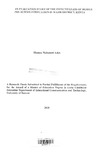| dc.description.abstract | The purpose of this study was to evaluate the effectiveness of mobile school education in Wajir District. The study adopted a descriptive method using survey design. The target population included 1 DEO, 2 AEOs, 5 headteachers, 10 teachers, 30 parents, 5 chiefs, 10 elders and 60 children in the mobile schools. Purposive sampling technique was used to select the DEO, AEOs, headteachers and teachers. Simple random sampling was used to select parents, chiefs and elders. Simple random sampling was used to select children in the mobile schools for the interview and the observation. Frequency distribution and percentages were used to present the data.
The study found out that the community had a positive attitude towards the mobile schools. Seventy seven percent (n=23) of the parents rated them as good. The study also revealed that sixty three percent (n=19) of children showed that they had a positive attitude towards the mobile schools programme. Responses obtained indicated that children had acquired basic skills while in their nomadic setting. Sixty three percent (n=7) of elders said pupils who attended mobile school had been able to read and write.
Eighty percent (n=8) of the teachers said the programme enabled the children to acquire the basic literacy and numeracy skills. These statistics clearly show how useful and effective these mobile pre-schools are. The findings revealed that the enrolment and transition rates were high. Children transiting from mobile schools to regular schools were few compared to those transiting from pre-school mobile to class three.
The pupils' textbook ratio was 1:3 as recommended by Ministry of Education for mobile schools. The success of the mobile school programme was largely due to the community ownership of the programme by nomadic pastoralists of Wajir District who were the beneficiaries. However, teachers in the mobile schools had inadequate training of the multigrade skills and did not use locally available materials, which would enhance the nomadic children's performance. Based on the findings of this study, the researcher recommended that the mobile teachers be trained in multigrade teaching method and also be inducted on the use and importance of locally available materials for teaching and learning aids. The researcher suggests that there is need to carry out a similar research among other nomadic groups. | en_US |

